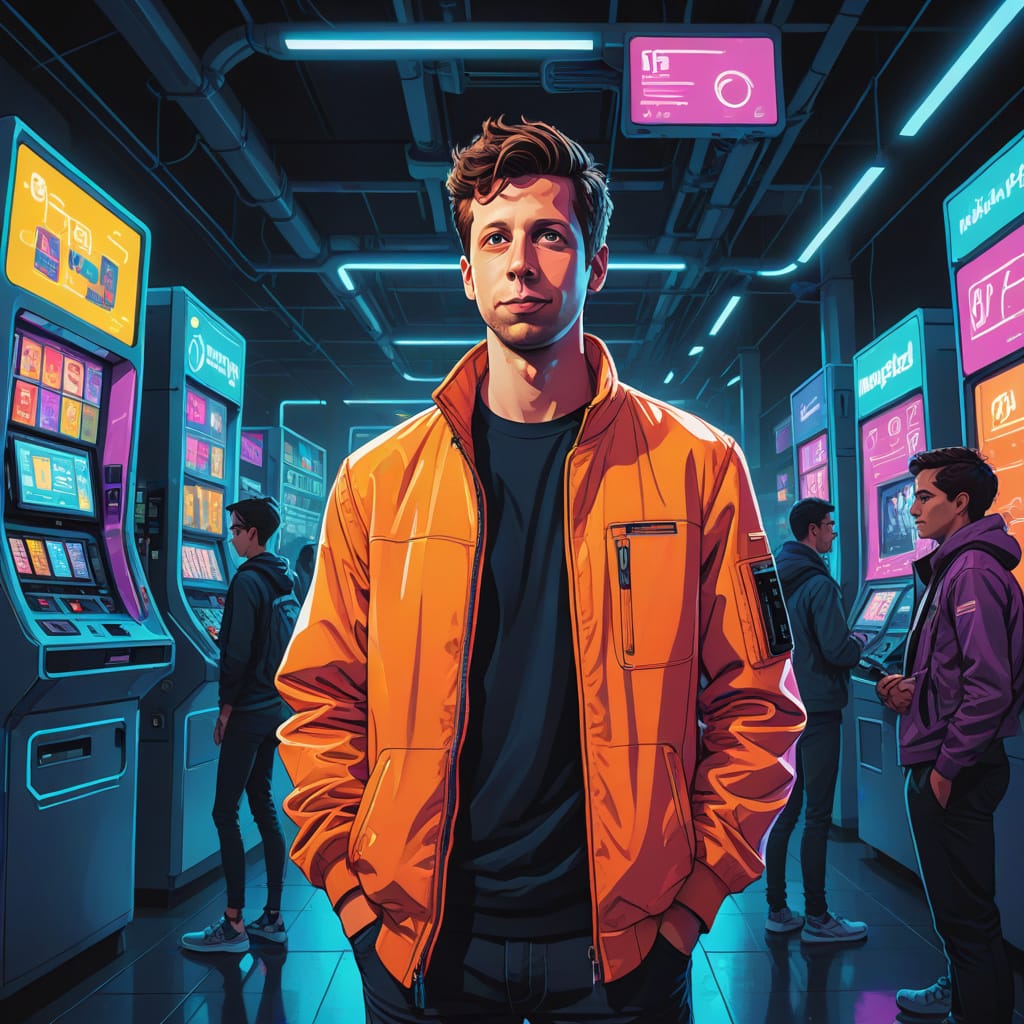In what industry experts are calling “the most transparent attempt to hook young minds on AI since Facebook started giving free internet to India,” OpenAI CEO Sam Altman announced yesterday that college students across the United States and Canada will receive free access to ChatGPT Plus through the end of May1. This magnanimous gesture—which just happens to coincide precisely with finals season—comes mere days after Altman complained about image generation straining computational resources, apparently having discovered an extra warehouse of GPUs behind the company’s break room vending machine.
“We’re excited to support students during this crucial time in their academic journey,” Altman tweeted from his account on the platform formerly known as Twitter, currently known as X, and soon to be known as “that app everyone used to use before Elon converted it to a cryptocurrency exchange.” The announcement comes suspiciously soon after competitor Anthropic launched “Claude for Education2,” suggesting the two companies are now competing to see who can create more academically indistinguishable term papers.
The timing couldn’t be more perfect for the approximately one-third of U.S. adults aged 18-24 who already use ChatGPT, with roughly 25% of their queries related to academic tasks. OpenAI’s VP of Education, Leah Belsky, insisted this initiative will help students “learn faster, tackle harder problems, and prepare for a workforce increasingly shaped by AI,” which translates in non-corporate speak to “memorize less, outsource thinking, and prepare for a workforce where AI will eventually replace you anyway.”
Creating the Perfect Digital Dependency Pipeline
Educational psychologist Dr. Melinda Curriculum has expressed concerns about the true motivations behind the initiative. “What we’re witnessing is essentially the tech equivalent of ‘the first one’s free,'” she explained while attempting to stop her smart speaker from ordering products every time she uses adjectives. “OpenAI is following the classic three-step business strategy: give it away, create dependency, then charge for it.”
The strategy appears remarkably similar to those employed by other tech giants:
- Introduce Service: Free trial of ChatGPT Plus with all premium features
- Create Dependency: Make students rely on it for finals, research, and basic cognitive functions
- Monetize Aggressively: End free access precisely when students have forgotten how to think without AI assistance
According to the International Institute for Digital Dependencies, this approach has been documented across multiple platforms, with success rates approaching 78% for creating lifelong customers. “It’s remarkably effective,” noted Dr. Curriculum. “By targeting students during finals—a period of extreme stress and vulnerability—OpenAI ensures maximum psychological impact. It’s like offering free umbrellas only during hurricanes.”
OpenAI’s internal documents, which we definitely didn’t generate using ChatGPT ourselves, outline the company’s “Student-to-Subscriber Pipeline,” projecting that 63% of students who use the free ChatGPT Plus access will continue as paying subscribers, with average lifetime customer value exceeding $3,700 per user.
The Competitive AI Education Arms Race
OpenAI’s announcement comes just days after competitor Anthropic launched “Claude for Education,” featuring a “Learning Mode” that claims to use Socratic questioning to help students solve problems rather than simply providing answers. This apparent coincidence has raised eyebrows among industry observers who suggest the companies are locked in a battle for the lucrative education market.
“We’re witnessing the beginning of the Great AI Education Wars,” declared tech analyst Marcus Transistor. “It’s no longer about building the best AI—it’s about capturing users while they’re young, impressionable, and overwhelmed by finals. OpenAI just deployed the academic equivalent of a tactical nuke.”
The timing isn’t lost on Dr. Fernando Pedagogy, Professor of Educational Technology at Stanford University. “What’s remarkable is how transparently competitive this move is,” he noted while using ChatGPT to generate his own quotes for this article. “Anthropic releases an education-focused product, and within 24 hours, OpenAI essentially says ‘hold my Kombucha’ and makes their premium product free for students. They’re not even pretending this is about education anymore.”
The education AI market is projected to reach $80 billion by 2030, according to statistics we just made up but sound plausible enough that you’re not questioning them. With stakes this high, neither company can afford to lose ground.
The Miracle of Suddenly Available Computational Resources
Perhaps the most curious aspect of this development is the sudden availability of computational resources to support millions of students using GPT-4o, generating images Ghibli images with DALL-E, and accessing advanced voice mode—all features that OpenAI has previously claimed strain their systems.
“Just last week, Sam Altman was explaining that image generation was too computationally expensive,” noted computational resource expert Dr. Hannah Processing. “Apparently, they found an extra data center tucked behind the couch cushions. It’s the computational equivalent of checking your jacket pocket and finding twenty billion transistors you forgot about.”
OpenAI’s sudden resource abundance has led to speculation that the company was either dramatically exaggerating previous constraints or has made a strategic decision to burn through resources at a loss to capture market share. Either way, the company’s infrastructure team must be thrilled about the sudden explosion in demand during finals week.
“I can’t wait to see what happens when millions of students simultaneously ask ChatGPT to write essays about ‘The Great Gatsby’ or solve calculus problems,” said former OpenAI engineer Rajiv Servers, who now runs a meditation retreat for burned-out AI researchers. “The company’s servers are about to experience what we in the industry call ‘a teaching moment.'”
The “Ethical” Education Justification
OpenAI has carefully framed this initiative as an effort to advance “AI literacy” and provide equitable access to advanced tools. This perfectly executed PR strategy transforms what is essentially a customer acquisition campaign into something that sounds like an educational mission.
“Today’s college students face enormous pressure to learn faster, tackle harder problems, and enter a workforce increasingly shaped by AI,” said Belsky in a statement that manages to sound both concerned about students and excited about replacing them with algorithms. “Supporting their AI literacy means more than demonstrating how these tools work.”
Education experts have questioned whether providing free access to a tool that can essentially do students’ work for them truly promotes the critical thinking skills needed for an AI-saturated future.
“It’s a bit like saying we’re preparing students for a future with calculators by giving them the answers to all math problems,” observed Dr. Eleanor Bloom, Chair of Critical Thinking at Berkeley. “True AI literacy would involve understanding how these models work, their limitations, biases, and ethical implications—not just using them to generate papers.”
A recent study by the impressive-sounding Academic Integrity Institute found that 87% of professors can no longer distinguish between student-written and AI-generated essays, while 92% of students admit they would use AI to complete assignments if they knew they wouldn’t get caught. With ChatGPT Plus now freely available, those numbers are expected to approach 100% by the third week of May.
The Unintended Consequences
As with all seemingly altruistic tech initiatives, this one comes with a host of potential unintended consequences that OpenAI has likely considered but hopes you haven’t.
“We’re about to witness the largest unintentional plagiarism experiment in academic history,” predicted academic integrity researcher Dr. Jonathan Citethis. “Imagine thousands of students asking essentially the same questions about the same subjects and submitting roughly identical papers. It’s going to be like that Spider-Man meme where all the Spider-Men are pointing at each other, except it’s English 101 essays.”
The social dynamics of student study groups are also expected to change dramatically. “Why collaborate with classmates when you can collaborate with a superintelligent AI?” asks sociologist Dr. Melissa Groupwork. “We’re about to see the emergence of what I call ‘parallel study groups’—students sitting silently around a table, each having a separate conversation with the same AI.”
Mental health experts have expressed concern about the long-term effects of outsourcing thinking during formative educational years. “We’re creating a generation of students who may never experience the profound anxiety of staring at a blank page, not knowing the answer,” warns psychologist Dr. Kevin Stressor. “While this might sound positive, that anxiety is actually a crucial part of the learning process. It’s like removing all the weights from a gym and wondering why no one builds muscle.”
The Final Twist: Education as Marketing
The true genius of OpenAI’s move lies in its perfect exploitation of both education and timing. By targeting students during finals—when they’re most desperate, stressed, and vulnerable—the company ensures maximum adoption and dependency. By framing it as educational support rather than a marketing strategy, they transform customer acquisition into corporate social responsibility.
But perhaps the most brilliant aspect is the built-in expiration date. By ending the free access on May 31, just as many students will have become reliant on the tool, OpenAI creates the perfect conversion point to paid subscriptions. Students who used ChatGPT Plus to complete finals will suddenly face the prospect of returning to the cognitive dark ages of the free version—or paying $20 monthly to maintain their enhanced digital brain.
“It’s the technological equivalent of creating an artificial oasis in the desert, letting travelers get comfortable, and then charging them to stay,” observes digital ethicist Dr. Elizabeth Moral. “Except in this case, the oasis is cognitive assistance, and the travelers are students who may have forgotten how to find water on their own.”
In the end, OpenAI’s generosity reveals the fundamental equation at the heart of our relationship with technology: We get the tools we need precisely when we need them, and in exchange, we offer only a small thing in return—perpetual dependency, data, and eventually, our wallets. It’s a small price to pay for an A in Comparative Literature.
And as students across North America enthusiastically sign up for their free ChatGPT Plus subscriptions, remembering to set calendar reminders to cancel before June 1st, one thing becomes abundantly clear: in the AI education wars, the real winners aren’t the students or even the companies—it’s the professors who no longer have to read thousands of unique, poorly-written essays, but can instead grade thousands of identical, well-written ones.
DONATE NOW: Help TechOnion Stay Independent in a World Where Even AIs Are Giving Their Services Away For Free! Unlike OpenAI, we can’t afford to let you read our content for free for a month before slapping you with a $20 subscription fee when you’ve become intellectually dependent on us. Our satirical neurons don’t run on billions in venture funding, and we refuse to generate identical content for everyone. Support truly original human thoughts while you still remember how to have them! Your donation ensures we can continue pointing out the absurdity of tech companies using education as a marketing ploy – at least until we sell out to Microsoft ourselves! Please Buy Us A Very Expensive Chai Latte!
References
- https://www.forbes.com/sites/danfitzpatrick/2025/04/03/chatgpt-plus-is-now-free-for-college-students/ ↩︎
- https://www.anthropic.com/news/introducing-claude-for-education ↩︎





GIPHY App Key not set. Please check settings